This week Stan tells the story of the tragedy of the largest man-made explosion in the pre-atomic age that happened 100 years ago this week, shares random thoughts about the college football playoffs, and remembers Cornelia Walker Bailey.
Category Archives: Sports
New Podcast: College Football Preview
This week’s Off the Deaton Path podcast previews the action-packed College Football Season that begins this Labor Day weekend. Stan inflicts on gridiron-loving fans his previews, predictions, half-baked ideas and inane commentary about the Dogs, Jackets, and other big games in September. Click and enjoy.
Guilty as Charged
A lot of people in Atlanta took umbrage at Dan Shaughnessy’s column in the Boston Globe about how disappointed the New England Patriots must be in having to play the Falcons in the Super Bowl. He didn’t really say anything bad about the Falcons or Atlantans, oddly enough. The gist of his argument is that Atlantans aren’t die-hard professional sports fans (and thus aren’t worthy of a spot in the NFL’s big game), but are instead crazy about college football.
how disappointed the New England Patriots must be in having to play the Falcons in the Super Bowl. He didn’t really say anything bad about the Falcons or Atlantans, oddly enough. The gist of his argument is that Atlantans aren’t die-hard professional sports fans (and thus aren’t worthy of a spot in the NFL’s big game), but are instead crazy about college football.
Guilty.
Don’t get me wrong, I love and support all of Atlanta’s professional sports team, and have all of my life, as numerous of these tedious blog posts will attest. I stand second to none in my fanaticism for the Braves, Falcons, and Hawks. Heck, I even loved the long-defunct Atlanta Flames and still support them in Calgary. I know that they currently own the 8th and last playoff spot in the NHL’s Western Conference right at this red-hot second. Find three other people south of the Mason-Dixon line who care about that, I dare you.
But yes, college football is king here. And news flash: we aren’t alone.
The Northeast is the only place where the love of pro football wins out over the college game because, with the exception of Boston College (for whom our beloved Matty Ice played), there is no college football north of Philadelphia worthy of the name. Rutgers doesn’t count, despite playing—if you can call Rutger’s performance last year “playing”—in the Big Ten.
Combine that with the fact that the Patriots are really, really good—as are the other Boston teams usually—and it’s understandable why professional sports fans there are legion.
Our fanaticism here is not because of the dearth of professional championships in Atlanta sports.
It’s because college football is more exciting and more fun to watch, in my humble and uninformed opinion.
The rivalries are much more intense, and the game-day atmosphere at big-time college football games is unmatched in any other sport. Any. Shaughnessy referenced lack of excitement in Atlanta last April about a Celtics-Hawks playoff matchup (which the Hawks won, by the way). Is he kidding? Seriously? The NBA?
For game-day excitement, try the Big House in Ann Arbor when Michigan plays Ohio State (ask Michigan alum Tom Brady about it). Or the Horseshoe in Columbus when it’s played there. Or in Oklahoma during Bedlam. Utah during the Holy War or Oregon’s Civil War. Also try finding cool names like these for NFL rivalries. You won’t.
The NFL has nothing—nothing—to compare to the Iron Bowl. Or the World’s Largest Outdoor Cocktail Party. Notre Dame vs. Southern Cal. Texas and Texas A&M (though temporarily suspended). Catholics vs. Convicts.
I’m not saying there aren’t great rivalries in the NFL—the Redskins and Cowboys, Patriots and Jets, and Packers and Bears all come to mind. Heck, the Falcons and Saints don’t like each other. And the best rivalries in baseball are the Yankees and Red Sox and Cubbies vs. Cards.
But it’s not the same as the blood feuds in college football, where many of these rivalries go back 130 years. The NFL has been around since the 1920s, but most franchises—including the Patriots—barely predate the 1960s. And rivalries are divisional (Cowboys-Redskins) not geographical, like Florida and Florida State, and don’t have nearly the emotional intensity of a life and death college football grudge match.
Boston’s a great sports town, make no mistake, and I can understand how the mighty Patriots might have wanted to play a different team, with a greater championship legacy. It’s like Montreal playing Phoenix in the Stanley Cup—hockey in Arizona?
But here’s a fact: when the Patriots won their first Super Bowl in 2002, they had played previously in two Super Bowls (1986 & 1997), exactly one more than the Falcons (1998) at that time. And they had lost both of those games, to the more storied NFL franchises, the Bears and the Packers.
Yes, they’ve won four since, but we all have to start somewhere, including the Patriots. Pittsburgh had won 4 Super Bowl titles before the Patriots ever even appeared in the big game for the first time in 1986.
In sports as in life, all glory is fleeting. One should be wary of acting too smug about how supreme your team is over time. The Dallas Cowboys have wandered in the playoff and championship wilderness for 20 years now after Troy Aikman and Emmitt Smith retired, and perhaps that fate awaits the Pats once Brady and Belichick are gone—which they will be one day.
Brady is a once-in-a-lifetime QB, and Belichick a once-in-a century coach. Their impact on that team is not unlike Michael Jordan’s and Coach Phil Jackson’s for the Chicago Bulls in the NBA. How many titles have the Bulls won without them? Zero.
Like Cowboys fans now, one can easily imagine a time in the not-so-distant future when Pats fans might be thrilled to play in the Super Bowl again after a long, long dry spell that nobody ever foresees when the champagne is flowing. They might one day even be thrilled to be playing against the Atlanta Falcons.
Rise up.
O Lost, and By the Wind Grieved
So my end-of-the year wrap-up blog is over two weeks late. That’s in part because I took a moment to enjoy the four days of cold weather that descended upon Savannah two weeks ago. Have no fear, this isn’t going to descend into another rant about the weather, but winter this year in Savannah was apparently scheduled for the four days surrounding that weekend, and I paused to enjoy it. It’s now spring again, here in mid January. Air-conditioners are running, trees are blooming, and grass will soon be growing and in need of trimming. Atlanta missed a record high on Christmas Eve by one degree, and came perilously close on Christmas Day. That’s two years in a row that bathing suits have been more in order at Yuletide than sweaters, and yours truly doesn’t like it. I don’t like it all. Okay, so it turned into a short rant about the weather. Sorry.
One good thing about delaying this column is that it gives me a chance to congratulate the Atlanta Falcons for winning their division, locking up the second seed in the NFC playoffs, a first-round bye, and a divisional win over the Seattle Seahawks. The rematch with the Green Bay Packers in this weekend’s NFC championship game will be a good one. Stay tuned.
 We can also congratulate the Clemson Tigers on knocking off the top-ranked Alabama Crimson Tide (after shutting out Ohio State) and winning the college football national championship. It’s not easy to beat Urban Meyer and Nick Saban, as Clemson did in this year’s playoff. The Tigers needed nearly all 60 minutes to beat Bama, but when it was over they had won their first national title in 35 years, thanks in large part to Gainesville native Deshaun Watson. How the Georgia schools let him get away is beyond me, but there he was wearing orange and purple and standing on the championship stage afterward. My prediction: Bama will be back in the playoff next year, and Clemson will be at home watching, with Watson and lot of other talent moving on. Everyone else has to rebuild; Saban just reloads and starts shooting again.
We can also congratulate the Clemson Tigers on knocking off the top-ranked Alabama Crimson Tide (after shutting out Ohio State) and winning the college football national championship. It’s not easy to beat Urban Meyer and Nick Saban, as Clemson did in this year’s playoff. The Tigers needed nearly all 60 minutes to beat Bama, but when it was over they had won their first national title in 35 years, thanks in large part to Gainesville native Deshaun Watson. How the Georgia schools let him get away is beyond me, but there he was wearing orange and purple and standing on the championship stage afterward. My prediction: Bama will be back in the playoff next year, and Clemson will be at home watching, with Watson and lot of other talent moving on. Everyone else has to rebuild; Saban just reloads and starts shooting again.
Another Goodbye to Another Good Friend: If you’re on social media at all, then you know that 2016 went down as one of the most unpopular years in recent memory, if we could take votes on such things. It was certainly a bad year for deaths in the entertainment industry, as you no doubt noticed yourself and as many other people have pointed out. The deaths of David Bowie, Prince, Glenn Frey, and many others left a huge void, and they’ve all been lovingly remembered and mourned on cultural and social media. There were many other famous passings, from Muhammad Ali to Nancy Reagan.
But lost among all those big names were some lesser stars in the firmament that you may or may not have heard of but should have. We’ll pause for a moment here and take one last look back at some other folks who shook off this mortal coil in 2016:
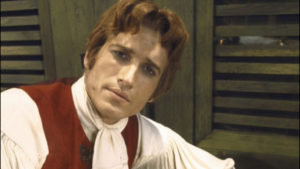 Though you may have missed it, Thomas Jefferson died in 2016, 190 years after his first death. Okay, so it wasn’t that Jefferson. But all the millions of fans of the movie musical 1776—of which I happen to be one—fondly remember Ken Howard’s lighthearted portrayal of Thomas Jefferson, long before he became The White Shadow on TV. The Tony- and Emmy-award-winning Howard died on March 23 at age 71.
Though you may have missed it, Thomas Jefferson died in 2016, 190 years after his first death. Okay, so it wasn’t that Jefferson. But all the millions of fans of the movie musical 1776—of which I happen to be one—fondly remember Ken Howard’s lighthearted portrayal of Thomas Jefferson, long before he became The White Shadow on TV. The Tony- and Emmy-award-winning Howard died on March 23 at age 71.
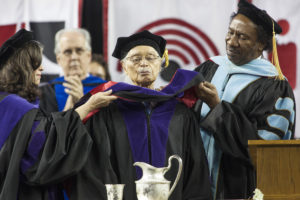 Horace Ward, born in LaGrange, Georgia, was the first African American to attempt to batter down the wall of segregation that prevented black students from attending the University of Georgia. In 1950 he applied to UGA Law School and was turned down, despite a stellar undergraduate career at Morehouse and Atlanta University. Ward tried and failed for nearly a decade to overturn the decision in court, but his case helped eventually to end segregation at Georgia’s flagship university after 175 years, when Hamilton Holmes and Charlayne Hunter were admitted in 1961. Ward went on to become the first African American ever to serve on the federal bench in Georgia, though he shamefully had to go elsewhere to earn his law degree. Judge Horace Taliaferro Ward died at the age of 88 on April 23 and is buried in Atlanta’s Westview Cemetery.
Horace Ward, born in LaGrange, Georgia, was the first African American to attempt to batter down the wall of segregation that prevented black students from attending the University of Georgia. In 1950 he applied to UGA Law School and was turned down, despite a stellar undergraduate career at Morehouse and Atlanta University. Ward tried and failed for nearly a decade to overturn the decision in court, but his case helped eventually to end segregation at Georgia’s flagship university after 175 years, when Hamilton Holmes and Charlayne Hunter were admitted in 1961. Ward went on to become the first African American ever to serve on the federal bench in Georgia, though he shamefully had to go elsewhere to earn his law degree. Judge Horace Taliaferro Ward died at the age of 88 on April 23 and is buried in Atlanta’s Westview Cemetery.
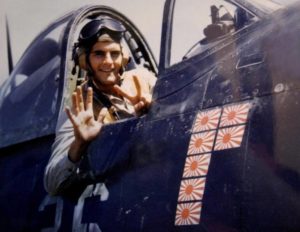 On April 22, 1945, Jerry O’Keefe of Ocean Spring, Mississippi, shot down five Japanese planes over Okinawa in his first aerial dogfight. He was 21 years old. After the war he went into the insurance business and became mayor of Biloxi, where—Mississippi born and bred—he faced down and arrested members of the Ku Klux Klan who marched there without a permit. The Klan sent him death threats and burned a cross on his lawn. The warrior who earned the Air Medal, the Navy Cross, the Distinguished Flying Cross, and the Congressional Gold Medal died on August 23 at age 93.
On April 22, 1945, Jerry O’Keefe of Ocean Spring, Mississippi, shot down five Japanese planes over Okinawa in his first aerial dogfight. He was 21 years old. After the war he went into the insurance business and became mayor of Biloxi, where—Mississippi born and bred—he faced down and arrested members of the Ku Klux Klan who marched there without a permit. The Klan sent him death threats and burned a cross on his lawn. The warrior who earned the Air Medal, the Navy Cross, the Distinguished Flying Cross, and the Congressional Gold Medal died on August 23 at age 93.
It took William H. McNeill ten years to write The Rise of the West: A History of the Human Community, but after its publication in 1963 it became a surprising best seller and won the National Book Award for history and biography. As Clifton Fadiman said, it is “deeply reflective, the work of a master scholar.” Hugh Trevor-Roper, no slouch himself, called it “the most learned…the most intelligent…the most stimulating and fascinating book that has ever set out to recount and explain the whole history of mankind.” It remains unsurpassed in scope and breadth, one of 20 books that McNeill wrote in a long and distinguished career. If you haven’t read it, you should. McNeill died on July 8 at 98.
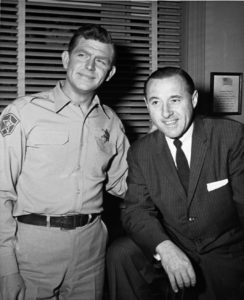 Andy Griffith fans everywhere (like me) have Richard Linke to thank for Griffith’s discovery and the TV show that brought him worldwide fame as the mighty sheriff of Mayberry. While working for Capitol Records, Linke was sitting by his radio one clear night in 1953 when he picked up a southern station broadcasting Griffith’s recording of “What it Was, Was Football.” Linke knew something special when he heard it. He flew immediately to North Carolina, bought the rights to the record for Capitol for $10,000, signed Griffith to a contract, and managed his career for the rest of his life. As Griffith put it, “had it not been for him, I would have gone down the toilet.” Linke died on June 15 at 98.
Andy Griffith fans everywhere (like me) have Richard Linke to thank for Griffith’s discovery and the TV show that brought him worldwide fame as the mighty sheriff of Mayberry. While working for Capitol Records, Linke was sitting by his radio one clear night in 1953 when he picked up a southern station broadcasting Griffith’s recording of “What it Was, Was Football.” Linke knew something special when he heard it. He flew immediately to North Carolina, bought the rights to the record for Capitol for $10,000, signed Griffith to a contract, and managed his career for the rest of his life. As Griffith put it, “had it not been for him, I would have gone down the toilet.” Linke died on June 15 at 98.
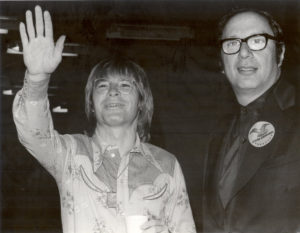 Producer and arranger Milt Okun performed a similar service for music fans. He helped create the Chad Mitchell Trio and when Mitchell left in 1965, Okun discovered and hired Henry John Deutschendorf, Jr. to replace him. Okun turned John Deutshchendorf into John Denver and produced and published the music that made him a folk and pop legend. The man who gave the world the musical gift of the Bard of the Rocky Mountains died on November 15 at age 92.
Producer and arranger Milt Okun performed a similar service for music fans. He helped create the Chad Mitchell Trio and when Mitchell left in 1965, Okun discovered and hired Henry John Deutschendorf, Jr. to replace him. Okun turned John Deutshchendorf into John Denver and produced and published the music that made him a folk and pop legend. The man who gave the world the musical gift of the Bard of the Rocky Mountains died on November 15 at age 92.
If you’re a fan of classic cartoons like me, you’ve heard the voice of Janet Waldo all of your life. She was the female Mel Blanc, bringing dozens of animated characters to life over the last 60 years, from Josie in “Josie and the Pussycats,” to Judy Jetson, Penelope Pitstop, and Fred Flintstone’s mother-in-law. She died on June 12 at the age of 96.
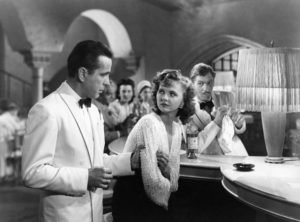 And if you’re a devotee of classic movies, one death last year was especially notable: Madeleine Lebeau was 19 years old when she was cast as Yvonne in Casablanca, and she achieved screen immortality by singing “La Marseillaise” with tears streaming down her face. When she died on May 1 at age 92, the French culture minister Audrey Azoulay said, “She will forever be the face of French resistance.” Lebeau was the last surviving credited cast member of what is arguably the best film ever made.
And if you’re a devotee of classic movies, one death last year was especially notable: Madeleine Lebeau was 19 years old when she was cast as Yvonne in Casablanca, and she achieved screen immortality by singing “La Marseillaise” with tears streaming down her face. When she died on May 1 at age 92, the French culture minister Audrey Azoulay said, “She will forever be the face of French resistance.” Lebeau was the last surviving credited cast member of what is arguably the best film ever made.
There were other “lasts” who died in 2016: Bill Herz was the last surviving crew member of Orson Welles’ “War of the Worlds” 1938 radio broadcast that terrified listeners with the news of Martians invading New Jersey. Herz died on May 10 at 99.
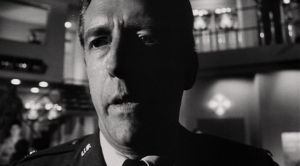 Two other big-screen deaths of note: Fritz Weaver was an all-purpose actor who appeared in dozens of movies and TV shows since the 1950s, but to my mind his most notable role was as the paranoid Air Force Colonel Cascio, who refuses to help the Russians shoot down American planes in the 1964 Cold War thriller Fail Safe. Diehard “Twilight Zone” fans will remember him from the episodes “Third From the Sun” and “The Obsolete Man.” He died November 26 at age 90.
Two other big-screen deaths of note: Fritz Weaver was an all-purpose actor who appeared in dozens of movies and TV shows since the 1950s, but to my mind his most notable role was as the paranoid Air Force Colonel Cascio, who refuses to help the Russians shoot down American planes in the 1964 Cold War thriller Fail Safe. Diehard “Twilight Zone” fans will remember him from the episodes “Third From the Sun” and “The Obsolete Man.” He died November 26 at age 90.
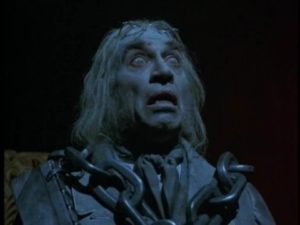 Similar to Weaver, Frank Finlay had a long and distinguished career across the stage and screen, but every Christmas he returns as Jacob Marley’s ghost in the 1984 George C. Scott version of A Christmas Carol, the best of them all, in my humble and uninformed opinion. Finlay died on January 30 at 89.
Similar to Weaver, Frank Finlay had a long and distinguished career across the stage and screen, but every Christmas he returns as Jacob Marley’s ghost in the 1984 George C. Scott version of A Christmas Carol, the best of them all, in my humble and uninformed opinion. Finlay died on January 30 at 89.
The 1990s TV show “Homicide: Life on the Street” was groundbreaking television and is considered by many to be one of the best shows ever produced. I happen to be one of those people. 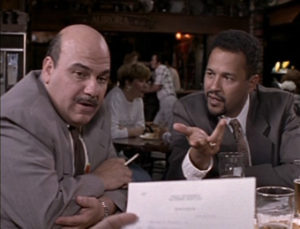 One of the finest episodes was Season Three’s “Crosetti,” which explored the suicide of Detective Steve Crosetti and its devastating impact on his fellow officers. Jon Polito played Crosetti for only two seasons but he left an indelible mark on the show, as well as the numerous characters he created as a stock player in several Coen Brothers’ films, including The Big Lebowski. He also played Jerry and Kramer’s landlord in the Season Nine “Seinfeld” episode “The Reverse Peephole.” Jon Polito died on September 1 at age 65.
One of the finest episodes was Season Three’s “Crosetti,” which explored the suicide of Detective Steve Crosetti and its devastating impact on his fellow officers. Jon Polito played Crosetti for only two seasons but he left an indelible mark on the show, as well as the numerous characters he created as a stock player in several Coen Brothers’ films, including The Big Lebowski. He also played Jerry and Kramer’s landlord in the Season Nine “Seinfeld” episode “The Reverse Peephole.” Jon Polito died on September 1 at age 65.
 A personal memory: my mother had a wonderful and eclectic album collection when I was growing up, and one of my favorites was the steel guitar sounds of Al Caiola. You may think you don’t know him but you do: he recorded scores of instrumental versions of movie and TV show themes that became big hits and the soundtrack of a generation, most famously “The Magnificent Seven” and “Bonanza.” The next time you hear Paul Anka’s “Put Your Head on My Shoulder,” Neil Sedaka’s “Calendar Girl,” Bobby Darin’s “Mack the Knife” or “Splish-Splash,” Simon & Garfunkel’s “Mrs. Robinson,” Johnny Mathis’ “Chances Are,” Del Shannon’s “Runaway” and Ben E. King’s “Stand by Me,” you’re listening to the great guitarist who died in a New Jersey nursing home on November 9. He was 96.
A personal memory: my mother had a wonderful and eclectic album collection when I was growing up, and one of my favorites was the steel guitar sounds of Al Caiola. You may think you don’t know him but you do: he recorded scores of instrumental versions of movie and TV show themes that became big hits and the soundtrack of a generation, most famously “The Magnificent Seven” and “Bonanza.” The next time you hear Paul Anka’s “Put Your Head on My Shoulder,” Neil Sedaka’s “Calendar Girl,” Bobby Darin’s “Mack the Knife” or “Splish-Splash,” Simon & Garfunkel’s “Mrs. Robinson,” Johnny Mathis’ “Chances Are,” Del Shannon’s “Runaway” and Ben E. King’s “Stand by Me,” you’re listening to the great guitarist who died in a New Jersey nursing home on November 9. He was 96.
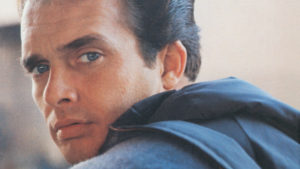 Finally, the man known to his legion of fans as The Hag died on his 79th birthday on April 6. As Keith Richards said, “One of the great country singers of all time and a helluva guitar player. Gonna miss you pal.”
Finally, the man known to his legion of fans as The Hag died on his 79th birthday on April 6. As Keith Richards said, “One of the great country singers of all time and a helluva guitar player. Gonna miss you pal.”
Literary Mountains Climbed: In 2016 I read 31 books totaling almost 12,000 pages. Among them were two that I’ve had on my list for a long time: War and Peace by Leo Tolstoy, and Thomas Wolfe’s Look Homeward, Angel.
 Tolstoy’s masterpiece, first published in 1869, is as advertised, one of the best books I’ve ever read. Don’t let its size daunt you: the version I read, Easton Press’s leather-bound edition in its series “The 100 Greatest Books Ever Written,” came in at 1,035 closely written pages. The Count of Monte Cristo and Les Miserables were both longer. It took me 45 days to read, an average of 23 pages a day. That’s easily doable, and most days I read closer to 30-40. It was well worth the time and effort.
Tolstoy’s masterpiece, first published in 1869, is as advertised, one of the best books I’ve ever read. Don’t let its size daunt you: the version I read, Easton Press’s leather-bound edition in its series “The 100 Greatest Books Ever Written,” came in at 1,035 closely written pages. The Count of Monte Cristo and Les Miserables were both longer. It took me 45 days to read, an average of 23 pages a day. That’s easily doable, and most days I read closer to 30-40. It was well worth the time and effort.
For all of its reputation, it’s not hard to read, and the Russian names are not hard to follow. The best advice I can offer is just start reading and keep at it; the names will sort themselves out in good time, and the story will carry you along. Tolstoy is not Dostoyevsky; he doesn’t drill down a thousand feet, he is not concerned with the abstract, the unconscious, or the abnormal. Tolstoy is focused on human life, in all its vastness and complexity, and that’s his real subject in this book. The book drops down into a group of people’s lives and it leaves them still struggling at the end. Along the way, you learn a lot about them, about the choices we all make as human beings—and you’ll learn about yourself as well. As literary critic Clifton Fadiman said so well, “once a few minor hazards are braved, this vast chronicle of Napoleonic times seems to become an open book, as if it had been written in the sunlight.” This is a timeless book with its own rhythm that will have a lasting effect on you long after you finish it, as all great books do. Read it like eating an elephant, one bite at a time. You will not regret it.
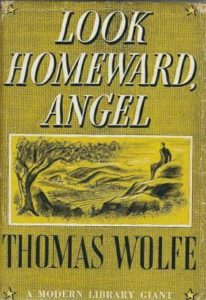 Thomas Wolfe’s “young-man-from-the-provinces” theme in his semi-autobiographical Look Homeward, Angel: A Story of the Buried Life (1929) will be familiar to anyone who’s read Stendahl’s classic The Red and the Black. Wolfe of course takes the genre to another level and inspired a host of writers since. I had long imagined Wolfe to be as impenetrable as William Faulkner, but in this I was completely wrong.
Thomas Wolfe’s “young-man-from-the-provinces” theme in his semi-autobiographical Look Homeward, Angel: A Story of the Buried Life (1929) will be familiar to anyone who’s read Stendahl’s classic The Red and the Black. Wolfe of course takes the genre to another level and inspired a host of writers since. I had long imagined Wolfe to be as impenetrable as William Faulkner, but in this I was completely wrong.
After reading A. Scott Berg’s Max Perkins: Editor of Genius, Berg’s award-winning biography of the legendary Scribner’s editor who tamed and cut Wolfe’s rambling prose down to size, I decided to tackle the novel and see for myself. Wolfe’s telling of Eugene Gant’s growing up to age 19 in Altamont, North Carolina, is a tour-de-force: ““By God, I shall spend the rest of my life getting my heart back, healing and forgetting every scar you put upon me when I was a child. The first move I ever made, after the cradle, was to crawl for the door, and every move I have made since has been an effort to escape.” The Gant family was, to put it mildly, dysfunctional before that word became stylish, and Wolfe spares no one. His real hometown of Asheville turned harshly on him when the novel was released because of his unsparing portrait, but he remains North Carolina’s most famous author. The first thing I did after I finished was to order the sequels: Of Time and the River, The Web and the Rock, and You Can’t Go Home Again, the latter two published after Wolfe’s untimely death at 37 in 1938.
Wolfe’s literary star has fallen since his death, unlike those of contemporaries Faulkner, Hemingway, and F. Scott Fitzgerald. In my uninformed opinion he towers over them all, and his books deserve to be more widely read. The title of this essay is perhaps the most famous passage from Wolfe’s first novel and the title he preferred for it. It was for good reason that critic Malcolm Cowley wrote that Wolfe was “the only contemporary writer who can be mentioned in the same breath as Dickens and Dostoevsky.”
Other Mountains Climbed in 2016: Last year in my end-of-year column I wrote that some of my 2016 goals were: “Exercise more. Run more. Read more. Write more. Listen more. Hike more. Bike more. Talk less. Eat less. Complain less. Argue less. Get angry less. Watch TV less. To pick up the phone and talk to someone I haven’t talked to in a long time. To renew friendships and make new ones. To try on a daily basis, as Thomas Jefferson so eloquently put it, to take life by the smooth handle. To meet life and its challenges and opportunities with stoicism. To try, as Marcus Aurelius said, to arise each morning and remember what a precious privilege it is to be alive.”
I succeeded in some areas (I exercised 316 days last year) and not so much in others. The list seems pretty good as I read over it again, so I’ll stick with it for this year. Whatever your goals and aspirations, I hope you succeeded in 2016.
To one and all who took the time to read a word of this blog last year—or any year—I offer my heartfelt thanks. Happy New Year, and I hope to see more of you here in 2017.
Higher Ground
Come all you no-hopers, you jokers and rogues
We’re on the road to nowhere, let’s find out where it goes
It might be a ladder to the stars, who knows?
Come all you no-hopers, you jokers and rogues.
Port Isaac’s Fishermen’s Friends, “No Hopers, Jokers, and Rogues”
 Hello again. As long-suffering and loyal readers of this blog (both of them) well know, it’s been eight long months since my last entry. There are many reasons for that silence, some of which I’ll write about in the New Year—my involvement in the national discussion about Confederate memorials and iconography in public spaces, three glorious Rolling Stones concerts this summer, not one but two GHS public programs about Leo Frank in the summer and fall, the Georgia History Festival Kickoff lecture in October on the real Mad Men and the world they created, and a host of other things that make my job so interesting. As the year draws to its close, it seemed like a good time to say a quick hello and goodbye to 2015, to take stock of the year, take a peek at what might lie ahead, and to set a few goals for the New Year. A few musings at the end of the year, in no particular order:
Hello again. As long-suffering and loyal readers of this blog (both of them) well know, it’s been eight long months since my last entry. There are many reasons for that silence, some of which I’ll write about in the New Year—my involvement in the national discussion about Confederate memorials and iconography in public spaces, three glorious Rolling Stones concerts this summer, not one but two GHS public programs about Leo Frank in the summer and fall, the Georgia History Festival Kickoff lecture in October on the real Mad Men and the world they created, and a host of other things that make my job so interesting. As the year draws to its close, it seemed like a good time to say a quick hello and goodbye to 2015, to take stock of the year, take a peek at what might lie ahead, and to set a few goals for the New Year. A few musings at the end of the year, in no particular order:
Sports: In a blog post from last January, I praised the high-flying Atlanta Hawks and wondered how far they’d go. The answer turned out to be the Eastern Conference finals, farther than they’d ever been, and in which they got swept by the far-better Cleveland Cavaliers. They’re looking good this year too, but the lack of a true big man may yet be their undoing. Stay tuned.
As you well know, the Falcons started out 5-0 and yet will not make the playoffs for the second straight year, having squandered that glorious start by losing six straight games. But let’s give Dan Quinn time to build his own team; better things ahead here.
As hard as it is to believe, I think the same is true of the Braves. They’ve traded everyone on the team who had talent except for Freddie Freeman, and they played stink-ola baseball for most of last season and undoubtedly will again in the one to come. But some analysts are now predicting that the recent trades—as painful as they’ve been—are setting the Braves up to be the next Kansas City Royals or Houston Astros, young teams on the rise and winning championships. Cheers to that. I lived through the not-too-shabby years in the 1970s and have no desire to do it again.
Finally, there’s the Mark Richt firing/mutual parting. I’ve been as vocal as anyone that it was high time for a change at UGA, but after the Dogs finished 9-3 this year I thought there was no way it would happen. But it did, among much angst and hand-wringing and gnashing of teeth. As is required whenever discussing Richt, we must first say that he is a nice guy. A great guy. A man who’s done great things at the University of Georgia. But I’ve always maintained that there are lots of coaches who could take Georgia’s talent and win 9 or 10 games. Let’s see if we’ve finally got one who can win 12 or 13.
And with the college football playoffs beginning tonight, as an unabashed SEC fan I say: Roll Tide.
Books: I’ve read many great books this year that enlightened, informed, and entertained. Here are just a few of the ones I’d recommend:
Thomas Paine, The Age of Reason (1794-95): Thomas Paine was an 18th-century equivalent of Donald Trump, a bomb-thrower extraordinaire who in just a few words could set the settled order of nature on its ear. Unlike Trump, Paine was a disciple of the Enlightenment and a fervent believer in breaking the chains that had bound men in body and mind since time immemorial. Whether in Common Sense, The American Crisis, or The Rights of Man, Paine was a caustic critic of anything that smacked of orthodoxy. This book, published in several parts beginning in 1794, was one of his last great works, but instead of kings and governments, he chose the biggest target of all: religion.
It is not for the faint of heart, a literary broadside against the belief in revealed religion and what he calls a “superstitious” belief in a supernatural being who created the Earth in seven days and continues to dabble in our daily affairs. He throws down the gauntlet right at the beginning: “I do not believe in the creed professed by the Jewish church, by the Roman church, by the Greek church, by the Turkish church, by the Protestant church, nor by any church that I know of. My own mind is my own church.” Institutionalized religion, Paine argues, are “human inventions set up to terrify and enslave mankind, and monopolize power and profit.”
Paine’s ideas weren’t new, but his engaging style of writing brought Deism down to the level of the common man and made it all the more dangerous and radical for that. His ideas are still terrifying to many people. After more than two hundred years, Paine’s ideas are still extremely unpopular and considered dangerous in much of the America of 2015 that fervently believes that this is a Christian nation and that our elected leaders should be Born Again. At a time when we’re having a broad discussion about the place and role of religion in our national lives, this is a great and timely read. Whatever your beliefs, it will, like all great books, challenge you to stand on new ground. I highly recommend it.
Charles Dickens, The Posthumous Papers of the Pickwick Club (1836-37). You can never go wrong with Dickens. One of the great glories lying ahead of me in my life is the pleasure of reading all of his works, fiction and non-fiction alike. I’ve read Great Expectations, A Tale of Two Cities, David Copperfield, and of course many of his Christmas stories. Unencumbered by the thought process, as our NPR friends Click and Clack used to say, I think this one is the best of them all. Unlike many of Dickens’ books, it’s not depressing—except for the fact that he could write so well and with such penetrating insight into the human condition at the tender age of 24—and in fact is hilarious. Here are the exploits of Mr. Samuel Pickwick and his companions Tracy Tupman, Nathaniel Winkle, and Augustus Snodgrass—and the irrepressible and singular Samuel Weller—as they travel around England, meeting some of the most interesting characters ever conceived along the way—Alfred Jingle, the residents of Dingley Dell, Joe the Fat Boy, Mr. Wardle, and many others. This one is a feast that I’m still working on and not anxious to finish.
Clayton Rawson, Death from a Top Hat (1938): A classic locked-room mystery, the first of four featuring the Great Merlini, a magician and amateur sleuth. It’s exactly what it sounds like: a body is found in an apartment with all the doors and windows sealed. He was strangled but how did the murderer leave? One of the best locked-room mysteries ever and great nightly bedtime reading. The classic Dell paperback is hard to find but this and the others in the series are all available on Kindle. A great way to drift off to the land of Morpheus.
Washington Irving, Bracebridge Hall, or The Humorists (1822). I first dipped into this book sitting in my favorite swing by the side of Lake Trahlyta at Vogel State Park on a warm August afternoon, but I saved it for the cooler days and darker nights of November, for which it’s better suited. It’s a collection of Irving’s short stories published under his pseudonym Geoffrey Crayon and supposedly collected when Crayon visited his friend Frank Bracebridge for his wedding in England. It follows up The Sketchbook of Geoffrey Crayon, which first introduced the Bracebridge family (and which featured Sleepy Hollow and Rip Van Winkle as bonuses), and preceded Tales of a Traveller.The collection contains some of the classic descriptions of the English countryside and the people who live there that made Irving famous and features some of his best stories—”The Stout Gentleman,” “The Haunted House,” “The Storm Ship,” and “Dolph Heyliger” among them. As lauded as Irving is for “The Legend of Sleepy Hollow,” his other writings go mostly unread today, and they shouldn’t. When the leaves turn golden in November, I always reach for him.
Yes, I read history and biography too, fear not. In preparing for the Georgia History Festival Kickoff Lecture on “The Birth of the American Dream” and the real Mad Men who created it, I reread David Halberstam’s The Fifties (1993). Halberstam is above all else a reporter and storyteller, and his descriptions of the people and events of that decade are exceptional. For a more detailed historical study, I turned to a volume in the Oxford History of the United States series, James Patterson’s Grand Expectations: The United States, 1945-1974 (1996). Both of these books clock in at over 800 pages, so they aren’t light reading, but they’re both well worth your time. You can’t hurry through them and you don’t want to. Linger in the land of Lucy, Elvis, and The Bomb.
Reaching back to an earlier period, I also read Edward Larson’s The Return of George Washington, 1783-1789 (2014), coupled with the first volume of James Thomas Flexner’s classic multivolume biography of Washington, George Washington: The Forge of Experience, 1732-1775 (1965). Surprisingly, given the fame of Flexner’s set and his authoritative position in the Washington canon, I preferred Larson’s elegant and graceful prose, covering a period of Washington’s life that is often overlooked, the years between the American Revolution and his presidency. Larson convincingly argues that without Washington’s backing there never would have been a Constitution, demonstrating the enormous influence he had on the final document just by his presence in the room. Highly recommended.
This past year certainly hasn’t lacked for materials for the historian who plies his trade in the public realm. From the ISIS atrocities that bore eerie similarities to events in this country a century ago when African Americans were burned alive, mutilated, and lynched, to the mass shooting in Charleston that led to a national discussion of the role of Confederate iconography in American life, to the rise of Donald Trump, an egomaniacal “strongman” with echoes in Huey Long, Joseph McCarthy, and George Wallace, there has been plenty to comment on and write about as we try to sort out and make sense of the events in our daily lives and their historical antecedents. This next year will bring more of the same no doubt, as we enter a presidential election year that promises to be one of the most interesting and pivotal in our nation’s history. More on all of this anon.
Turn off your engines and slow down your wheels
Suddenly your master plan loses its appeal
Everybody knows that this reality’s not real
So raise a glass
To all things past
And celebrate how good it feels.
Port Isaac’s Fishermen’s Friends, “No Hopers, Jokers, and Rogues”
Next Year: For the New Year, I certainly have goals, if not resolutions. Any time of the year is a good time to set a goal (just like any day is a good day to start a diet), but since the New Year is the traditional time for clean slates, we’ll play along.
In 2016, I want to be more patient, especially with my daughter but also with everyone in my life, including the jerk in the car in front of me who’s driving too slow, or the maroon (as Bugs Bunny said) in the car behind me who wants me to drive faster.
Next year I hope to be more empathetic and sympathetic towards other people and their daily struggles and concerns. In memory of my friend Will, I need to pay more attention to the silent sufferings of other people.
Next year I’d like to find the courage to spend at least one hour every week visiting people that I don’t know in nursing homes and assisted living centers. They are among the most depressing places on Earth and are usually shunned by everyone who doesn’t need to go there. It’s hard to go there. And that’s one reason I’d like to start trying, to visit and spend time with people who have no one to talk to. I hope I have the courage to do it, and having written it down here in this public blog, perhaps I will. It’s a goal for 2016.
I’m so glad that he let me try it again
Cause my last time on earth I lived a whole world of sin
I’m so glad that I know more than I knew then
Gonna keep on tryin’
Till I reach my highest ground
Stevie Wonder, “Higher Ground”
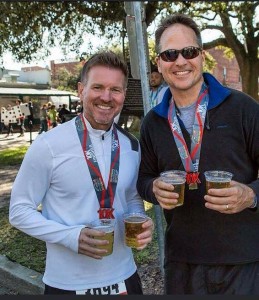 I have the usual goals next year that I have every year: Exercise more. Run more. Read more. Write more. Listen more. Hike more. Bike more. Talk less. Eat less. Complain less. Argue less. Get angry less. Watch TV less (except for “Better Call Saul,” “Fargo,” and the upcoming “X Files”). To pick up the phone and talk to someone I haven’t talked to in a long time. To renew friendships and make new ones. To try on a daily basis, as Thomas Jefferson so eloquently put it, to take life by the smooth handle. To meet life and its challenges and opportunities with stoicism. To try, as Marcus Aurelius said, to arise each morning and remember what a precious privilege it is to be alive.
I have the usual goals next year that I have every year: Exercise more. Run more. Read more. Write more. Listen more. Hike more. Bike more. Talk less. Eat less. Complain less. Argue less. Get angry less. Watch TV less (except for “Better Call Saul,” “Fargo,” and the upcoming “X Files”). To pick up the phone and talk to someone I haven’t talked to in a long time. To renew friendships and make new ones. To try on a daily basis, as Thomas Jefferson so eloquently put it, to take life by the smooth handle. To meet life and its challenges and opportunities with stoicism. To try, as Marcus Aurelius said, to arise each morning and remember what a precious privilege it is to be alive.
To one and all who have read a single word or every word of this blog since it began on October 15, 2013, and who have supported me along the way and given me a word of encouragement, thank you. I’ll see you here much more frequently in 2016. Cheers to you all.
